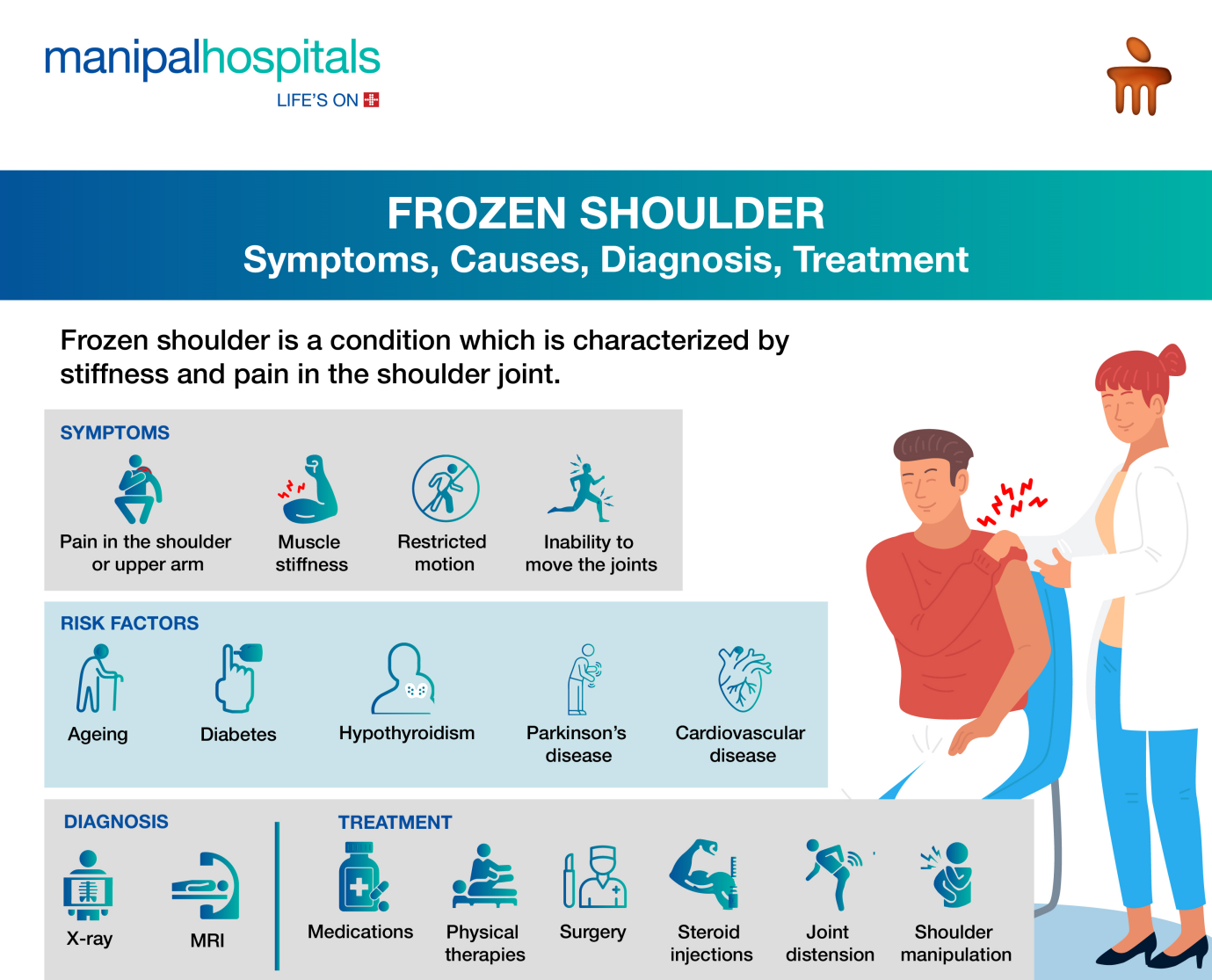
Frozen shoulder is a disorder that affects the shoulder joint and causes pain and stiffness. It is also known as adhesive capsulitis. It often affects adults between the ages of 40 and 60, and women more than men. About 3% of the population is thought to be affected. This condition may affect one or both shoulders.
The reason this condition is known as "frozen shoulder" is due to the shoulder capsule thickening and tightening from lack of usage, the shoulder becomes "frozen" in its place.

Signs and Symptoms of Frozen Shoulder Pain
Individuals will probably have dull or aching pain. The shoulder muscles that surround the top of the arm may also be painful and spread to the upper arm. It might be difficult to sleep at night if the pain gets severe.
Also, frozen shoulder signs and symptoms typically get worse with time. They are divided into three stages, which include:
-
Freezing stage
The range of motion is typically limited with pain in people with this stage of frozen shoulder. This stage may last from 6 weeks to 9 months.
-
Frozen stage
Although the discomfort might ease at this point, the shoulder will likely become stiffer and more challenging to move. It may last 4-6 months.
-
Thawing stage
Motion is more constrained within a given range. When a frozen shoulder reaches this ultimate stage, moving the shoulder is definitely more challenging. It could last for 6 months - 2 years.
Frozen Shoulder Pain Causes
The shoulder joint is protected by a covering of connective tissue, the capsule. A frozen shoulder occurs when the capsule around the shoulder joint swells and tightens, restricting movement. It is unknown why the tissues thicken and tighten, however, systemic disorders and prolonged immobilization of the shoulder, such as after surgery or after an arm fracture, are known to play a role in the development of this syndrome.
Risk Factors of Frozen Shoulder Pain
The following factors may increase the risk of a frozen shoulder:
-
Age and gender
Women 40 years of age or older are more likely to get frozen shoulders than younger women.
-
Immobilized and less mobilized shoulder
People who experience extended periods of shoulder immobility are more likely to develop it. A broken arm, rehabilitation from surgery, an injury, a stroke, or diminished mobility of the shoulder may cause it.
-
Systemic diseases
Frozen shoulders may develop as a result of certain systemic diseases, such as:
-
Diabetes
-
Hypothyroidism
-
Hyperthyroidism
-
Cardiovascular disease
-
Parkinson’s disease
-
Tuberculosis
Diagnosis of Frozen shoulder Pain
The doctor may perform a physical examination to evaluate the pain and assess active and passive ranges of motion. Usual methods for diagnosing a frozen shoulder include a thorough physical examination and a study of the signs and symptoms. However, specialist doctors may employ other imaging tests, like X-rays or MRIs, to look for other issues, such as rotator cuff tears or excessive calcification.
Treatment of Frozen shoulder
The frozen shoulder treatment aims to control the pain while improving the range of motion. Some of the common treatments for frozen shoulder include:
Medications
The doctor may recommend several medications, including painkillers and anti-inflammatory drugs, to reduce the pain and inflammation.
Therapies
Individuals are recommended to perform some range-of-motion exercises to encourage the mobility of the shoulder by their doctor with the help of a physical therapist. Strengthening and stretching exercises are preferred to improve the range of motion.
Medical and surgical procedures
The procedures involved in treating a frozen shoulder include:
-
Steroid injection
It is effective in reducing pain and improving range of motion. Steroids injected within the joint act mainly at the abnormal joint tissue, without major spread to the rest of the body, unlike steroid tablets or steroid drips.
-
Joint distension
The doctor injects sterile water into the shoulder capsule for stretching. This helps in improving the shoulder range.
-
Shoulder manipulation
It can help to loosen up the shoulder tissue. Doctors would forcefully move the shoulder while the patient is under general or local anaesthesia.
-
Surgery
This method is performed very rarely to treat frozen shoulders. However, if alternative therapies have failed, the doctor may recommend surgery. It would almost certainly be an arthroscopic surgery. This is performed using light, pencil-sized equipment placed through tiny wounds in the shoulder.
Visit a top pain medicine hospital if you need frozen shoulder treatment.
Frequently Asked Questions (FAQs)
1. How is a frozen shoulder diagnosed?
A thorough history along with a physical examination, possibly with X-rays or other testing is necessary for the diagnosis of a frozen shoulder.
2. What treatment is best for a frozen shoulder?
Anti-inflammatory medication is mainly recommended for frozen shoulder. Steroid injections are administered into the shoulder joint. Providing heat or ice to the shoulder joint is also preferred by the doctors. Physical therapy exercises are recommended for range of motion.
3. What are the first symptoms of a frozen shoulder?
Individuals experience persistent shoulder discomfort and stiffness; the pain may get worse during sleep. It also results in difficulty in moving the arm and shoulder.





















 4 Min Read
4 Min Read












